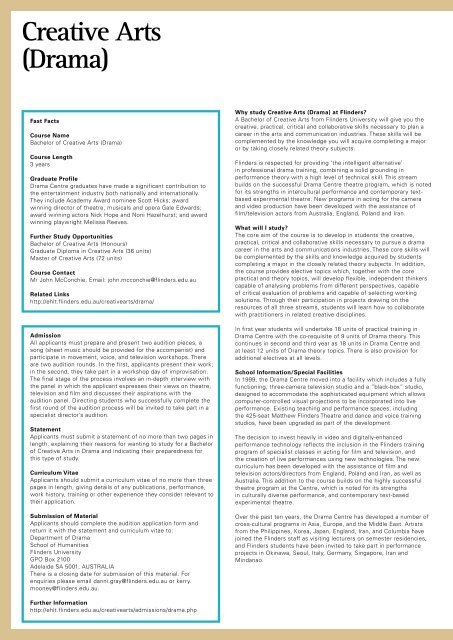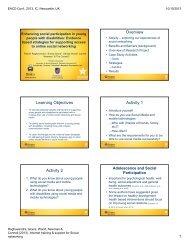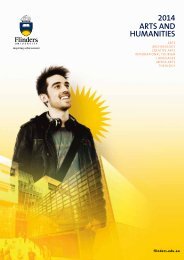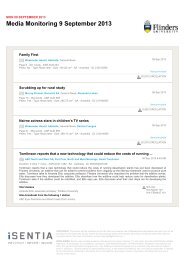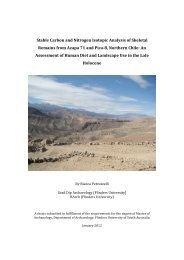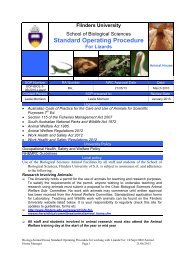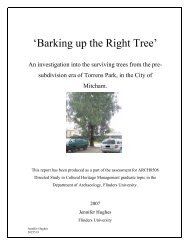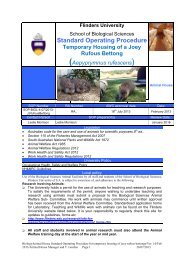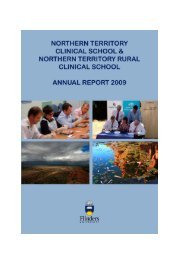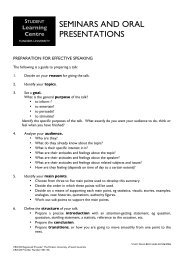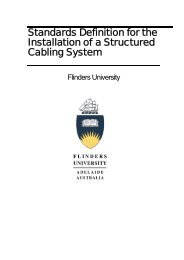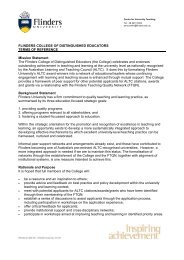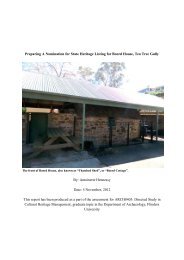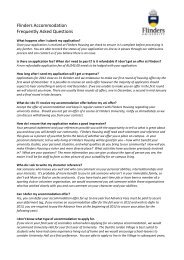Undergraduate - Flinders University
Undergraduate - Flinders University
Undergraduate - Flinders University
Create successful ePaper yourself
Turn your PDF publications into a flip-book with our unique Google optimized e-Paper software.
Creative Arts<br />
(Drama)<br />
Fast Facts<br />
Course Name<br />
Bachelor of Creative arts (drama)<br />
Course Length<br />
3 years<br />
Graduate Profile<br />
drama Centre graduates have made a significant contribution to<br />
the entertainment industry both nationally and internationally.<br />
they include academy award nominee Scott Hicks; award<br />
winning director of theatre, musicals and opera gale edwards;<br />
award winning actors nick Hope and noni Hazelhurst; and award<br />
winning playwright Melissa reeves.<br />
Further Study Opportunities<br />
Bachelor of Creative arts (Honours)<br />
graduate diploma in Creative arts (36 units)<br />
Master of Creative arts (72 units)<br />
Course Contact<br />
Mr John McConchie, email: john.mcconchie@flinders.edu.au<br />
Related Links<br />
http://ehlt.flinders.edu.au/creativearts/drama/<br />
Admission<br />
all applicants must prepare and present two audition pieces, a<br />
song (sheet music should be provided for the accompanist) and<br />
participate in movement, voice, and television workshops. there<br />
are two audition rounds. In the first, applicants present their work;<br />
in the second, they take part in a workshop day of improvisation.<br />
the final stage of the process involves an in-depth interview with<br />
the panel in which the applicant expresses their views on theatre,<br />
television and film and discusses their aspirations with the<br />
audition panel. directing students who successfully complete the<br />
first round of the audition process will be invited to take part in a<br />
specialist director’s audition.<br />
Statement<br />
applicants must submit a statement of no more than two pages in<br />
length, explaining their reasons for wanting to study for a Bachelor<br />
of Creative arts in drama and indicating their preparedness for<br />
this type of study.<br />
Curriculum Vitae<br />
applicants should submit a curriculum vitae of no more than three<br />
pages in length, giving details of any publications, performance,<br />
work history, training or other experience they consider relevant to<br />
their application.<br />
Submission of Material<br />
applicants should complete the audition application form and<br />
return it with the statement and curriculum vitae to:<br />
department of drama<br />
School of Humanities<br />
<strong>Flinders</strong> university<br />
gPO Box 2100<br />
adelaide Sa 5001, auStraLIa<br />
there is a closing date for submission of this material. For<br />
enquiries please email danni.gray@flinders.edu.au or kerry.<br />
mooney@flinders.edu.au.<br />
Further Information<br />
http://ehlt.flinders.edu.au/creativearts/admissions/drama.php<br />
Why study Creative Arts (Drama) at <strong>Flinders</strong>?<br />
a Bachelor of Creative arts from <strong>Flinders</strong> university will give you the<br />
creative, practical, critical and collaborative skills necessary to plan a<br />
career in the arts and communication industries. these skills will be<br />
complemented by the knowledge you will acquire completing a major<br />
or by taking closely related theory subjects.<br />
<strong>Flinders</strong> is respected for providing ‘the intelligent alternative’<br />
in professional drama training, combining a solid grounding in<br />
performance theory with a high level of technical skill. this stream<br />
builds on the successful drama Centre theatre program, which is noted<br />
for its strengths in intercultural performance and contemporary textbased<br />
experimental theatre. new programs in acting for the camera<br />
and video production have been developed with the assistance of<br />
film/television actors from australia, england, Poland and Iran.<br />
What will I study?<br />
the core aim of the course is to develop in students the creative,<br />
practical, critical and collaborative skills necessary to pursue a drama<br />
career in the arts and communications industries. these core skills will<br />
be complemented by the skills and knowledge acquired by students<br />
completing a major in the closely related theory subjects. In addition,<br />
the course provides elective topics which, together with the core<br />
practical and theory topics, will develop flexible, independent thinkers<br />
capable of analysing problems from different perspectives, capable<br />
of critical evaluation of problems and capable of selecting working<br />
solutions. through their participation in projects drawing on the<br />
resources of all three streams, students will learn how to collaborate<br />
with practitioners in related creative disciplines.<br />
In first year students will undertake 18 units of practical training in<br />
drama Centre with the co-requisite of 9 units of drama theory. this<br />
continues in second and third year as 18 units in drama Centre and<br />
at least 12 units of drama theory topics. there is also provision for<br />
additional electives at all levels.<br />
School Information/Special Facilities<br />
In 1999, the drama Centre moved into a facility which includes a fully<br />
functioning, three-camera television studio and a ”black-box” studio,<br />
designed to accommodate the sophisticated equipment which allows<br />
computer-controlled visual projections to be incorporated into live<br />
performance. existing teaching and performance spaces, including<br />
the 425-seat Matthew <strong>Flinders</strong> theatre and dance and voice training<br />
studios, have been upgraded as part of the development.<br />
the decision to invest heavily in video and digitally-enhanced<br />
performance technology reflects the inclusion in the <strong>Flinders</strong> training<br />
program of specialist classes in acting for film and television, and<br />
the creation of live performances using new technologies. the new<br />
curriculum has been developed with the assistance of film and<br />
television actors/directors from england, Poland and Iran, as well as<br />
australia. this addition to the course builds on the highly successful<br />
theatre program at the Centre, which is noted for its strengths<br />
in culturally diverse performance, and contemporary text-based<br />
experimental theatre.<br />
Over the past ten years, the drama Centre has developed a number of<br />
cross-cultural programs in asia, europe, and the Middle east. artists<br />
from the Philippines, Korea, Japan, england, Iran, and Columbia have<br />
joined the <strong>Flinders</strong> staff as visiting lecturers on semester residencies,<br />
and <strong>Flinders</strong> students have been invited to take part in performance<br />
projects in Okinawa, Seoul, Italy, germany, Singapore, Iran and<br />
Mindanao.<br />
Why study Creative Arts (Screen Studies) at <strong>Flinders</strong>?<br />
this stream provides the conceptual and practical groundwork<br />
needed to devise short, screen-based productions from conception<br />
to final presentation. It equips students with the intellectual and<br />
basic technical skills required to understand screen-based media and<br />
devise viable production projects, and introduces them to the various<br />
roles involved in screen production. they then specialise in specific<br />
skills, including producing, directing, writing, editing or production<br />
management.<br />
What is Screen Studies?<br />
Screens surround us. the new art forms of the twentieth century were<br />
created on cinema and television screens; the art and communication<br />
forms of the new century are being created on computer screens.<br />
these same screens also provide us with entertainment, information,<br />
education and, increasingly, the virtual environment in which we work.<br />
We now look at a world through a multitude of screens, and we<br />
understand its events as much through what they look like on screen<br />
as through the words people use to describe them.<br />
Students study the moving image as a technological force, an artistic<br />
medium, a textual system, and an instrument of ideology. they also<br />
investigate the economics of entertainment and information.<br />
What will I study?<br />
the core aim of the course is to develop in students the creative,<br />
practical, critical and collaborative skills necessary to pursue a career<br />
in the screen area in the arts and communications industries. these<br />
core skills will be complemented by the skills and knowledge acquired<br />
by students completing a major in the closely related theory subjects.<br />
the stream has three parts:<br />
1. a practical and creative arts core (66 units) with 18 units at first<br />
level, 24 units at second level and 24 units at third level. the practical<br />
and creative arts core is the heart of the proposed degree, providing<br />
the practical, workplace-oriented skills that set the degree apart from a<br />
liberal arts degree.<br />
2. a major sequence in the relevant theory subject (33 units)<br />
which will follow broadly the requirements of a Ba major with 9<br />
units at first level, 12 units at second level and 12 units at third<br />
level. Completion of the major sequence will provide students with<br />
intellectual skills which add value to those acquired through<br />
the practical core. the aim is to equip graduates with general<br />
skills and abilities that have direct relevance to the practical core and<br />
provide additional advantage to their success in the workplace after<br />
graduation.<br />
3. Other elective topics (13.5 units) are offered at first level.<br />
the production core will comprise 9 units of production topics at<br />
first level, 12 units at second level, and 12 units at third level. In each<br />
upper level year, 12 units will be dedicated to creative arts that include<br />
script writing, communication skills and professional writing for<br />
creative artists and legal and business skills. the production core will<br />
impart those skills necessary for entry into production industries after<br />
graduation.<br />
Career Information<br />
Screen graduates will be ‘industry ready’. equipped with the basic<br />
professional skills of screen production and a broad knowledge of<br />
screen media, they will be highly desirable candidates for entry into<br />
the film, television and digital media industries. graduates will have the<br />
opportunity to form emergent production companies capable of project<br />
development, to compete successfully for funds for short production<br />
and industry training, and to exploit the expanding opportunities<br />
created through new media arts and business.<br />
Fast Facts<br />
Creative Arts<br />
(Screen Studies)<br />
Course Name<br />
Bachelor of Creative arts (Screen Studies)<br />
Course Length<br />
3 years<br />
Further Study Opportunities<br />
Bachelor of Creative arts (Honours)<br />
graduate diploma in Creative arts (36 units)<br />
Master of Creative arts (72 units)<br />
Course Contact<br />
Mr John McConchie, email: john.mcconchie@flinders.edu.au<br />
Related Links<br />
http://ehlt.flinders.edu.au/creativearts/screen/<br />
Guidelines<br />
Show-reel, Portfolio and other supporting material<br />
applicants who wish to apply for the screen production program<br />
in the Bachelor of Creative arts must submit examples of their<br />
original work.<br />
Statement<br />
applicants must also submit a statement of no more than two<br />
pages in length, explaining their reasons for wanting to study for<br />
a Bachelor of Creative arts in Screen Production and indicating<br />
their preparedness for this type of study.<br />
Submission of Material<br />
applicants should complete the application details form and<br />
return it with the supporting material, statement and curriculum<br />
vitae to:<br />
department of Screen Studies<br />
School of Humanities<br />
<strong>Flinders</strong> university<br />
gPO Box 2100<br />
adelaide Sa 5001<br />
auStraLIa<br />
there is a closing date for submission of this material. For<br />
enquiries please email danni.gray@flinders.edu.au or kerry.<br />
mooney@flinders.edu.au.<br />
Interview<br />
evaluation criteria for short-listing and interview include:<br />
• existing skills in any area of screen production<br />
• demonstration of a realistic expectation of the outcome of<br />
tertiary training, the abilities required by various kinds of screen<br />
production and the options available after graduation<br />
• an ability to think critically as well as creatively<br />
• previous experience.<br />
If necessary we may contact applicants for an interview.<br />
no discussion of the reasons for acceptance or non-acceptance<br />
into the course for the Bachelor of Creative arts will be entered<br />
into.<br />
Further Information<br />
http://ehlt.flinders.edu.au/creativearts/admissions/screen.php<br />
inspiring achievement 43


